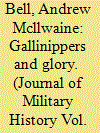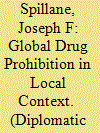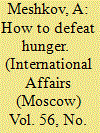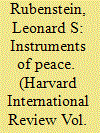|
|
|
Sort Order |
|
|
|
Items / Page
|
|
|
|
|
|
|
| Srl | Item |
| 1 |
ID:
095367


|
|
|
|
|
| Publication |
2010.
|
| Summary/Abstract |
Disease killed tow thirds of soldiers who died during the civil war. And of the various maladies that plagued both armies, few were more pervasive than malaria - a mosquito borne illness which affected over1.1 million soldiers serving in the Union ranks.
|
|
|
|
|
|
|
|
|
|
|
|
|
|
|
|
| 2 |
ID:
183947


|
|
|
|
|
| Summary/Abstract |
Cairo’s Qasr El Aini Hospital regularly received opiate addicts in poor health, but a startling new development in April 1929 captured the attention of Dr. Alexander Gordon Biggam, Director of the Medical Unit. Patients with a history of injecting heroin were being admitted with high fevers, and diagnored with falciparum malaria. Shocked by the prevalence of the disease, which appeared confined to networks of injection drug users, Dr. Biggam hypothesized—correctly—that the disease was being spread through contamined blood in shared syringes. “If the theory of the production of this malignant malarial infection amongst the heroin addicts is correct,” he concluded, “we are faced with a problem of considerable importance to the inhabitants of Cairo.”1 In the winter of 1932, a similar novel outbreak of malaria among injecting heroin users occupied Dr. Guy Henry Faget, an Assistant Surgeon at the United States Marine Hospital in New Orleans, a facility serving primarily merchant seamen. “If the hypodermic syringe must be accepted as a means of conveying malaria among narcotic addicts,” Dr. Faget warned, “then a new chapter in the epidemiology of this disease has been opened.
|
|
|
|
|
|
|
|
|
|
|
|
|
|
|
|
| 3 |
ID:
100331


|
|
|
|
|
| Publication |
2010.
|
| Summary/Abstract |
HEADS OF STATE will be meeting in New York in September to see what mankind has done to meet the Development Goals set by the UN Millennium Summit. They will of course focus on the global issue of struggle against hunger and malnutrition which is designated as goal number one.
It is generally believed that we have regrettably made no serious progress in cutting by half the number of starving people around the world by 2015. When for the first time the problem of hunger on the planet was taken up by the World Food Summit in 1996, the number of people who do not have enough to eat was estimated at 840,000,000. This figure regrettably exceeded one million last year against the backdrop of the financial turmoil around the world.
Today 31 countries around the world experience a dire need for food: 20 countries in Africa, 9 countries in Asia and the Middle East and 2 countries in Latin America. Even relatively successful developed countries have millions of residents from the more vulnerable sections of the population who either chronically do not have enough to eat or can't afford quality food. According to some devastating statistics, last year one child died every minute from hunger and related diseases while the total number of hunger-related deaths exceeded those caused by AIDS, ?? and malaria taken together.
This situation is largely due to the food crisis of recent years which resulted from a combination of a number of subjective and objective factors. The chronic lack of attention over many years to the needs of the agricultural sector and lack of funds for it, especially in the developing countries, is an important contributing factor.
|
|
|
|
|
|
|
|
|
|
|
|
|
|
|
|
| 4 |
ID:
109512


|
|
|
| 5 |
ID:
088076


|
|
|
|
|
| Publication |
2009.
|
| Summary/Abstract |
During the past ten years there has been an increased willingness by international
health organizations to include multisectoral nonstate actors
in their decisionmaking processes. The stated aim of expanding multisectoral
involvement is to increase information flows from those on the ground,
to create a sense of policy ownership by those implementing various health programs,
to create a more unified front against global health priorities, and to
create a more robust sense of institutional legitimacy. One such institution has
been the Global Fund to Fight AIDS, Tuberculosis and Malaria, which was designed
specifically to bring various stakeholders together to create a more coordinated
mechanism to combat three of the world's most destructive diseases.
The purpose of this essay is to discuss the role of nonstate actors in the
decisionmaking processes of the Global Fund. The aim of this discussion is
not to undermine the good work of the Global Fund, but to expose certain
structural weaknesses in the current way nonstate actors are incorporated into
the governance process and to illustrate how these structural processes might
negate their effective participation. By doing so, this exploration will help expose
various deficit gaps between the stated aims of multisectoral participation
within the Global Fund and its actual practice. The goal is to encourage normative
recommendations for increasing the real-world operation of stakeholder
inclusiveness, ownership, partnership, and participation within the Global Fund.
|
|
|
|
|
|
|
|
|
|
|
|
|
|
|
|
| 6 |
ID:
095620


|
|
|
|
|
| Publication |
2010.
|
| Summary/Abstract |
It is often argued that multilateralism is no longer an effective mechanism to respond to global priorities and that more deliberative and multisectoral governance is needed. To explore this, the purpose of this article is to examine the practice of mutlisectoral deliberation within the Global Fund to Fight AIDS, Tuberculosis and Malaria and to determine whether it has resulted in providing a more deliberative response to global health priorities. To do so, this article will apply various theoretical arguments for deliberative democracy to the results of a four year study on the multisectoral organisation the Global Fund. By making links between theory and practice, the article will argue that the multisectoralism practiced by the Global Fund continues to suffer from a deliberative deficit and that it has not safeguarded equal stakeholder participation, equal deliberation between stakeholders or alleviate the asymmetric power relationships which are representative of current forms of multilateral governance. Nevertheless, by locating these gaps between theory and practice, it is possible to outline deliberative safeguards that might, if constitutionally enhanced, pull the Global Fund closer to its own normative values of multisectoral deliberative decision-making.
|
|
|
|
|
|
|
|
|
|
|
|
|
|
|
|
|
|
|
|
|